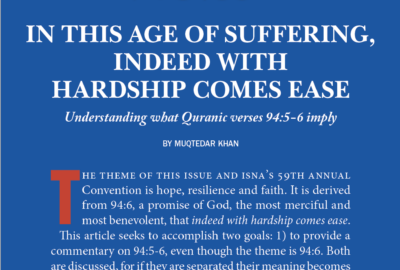Islam’s Future: The Importance of Social Sciences
Muslims correctly value those who have knowledge with good reason. They are led by the Ulema — Muslims scholars trained in Islamic law — who have determined how Muslims understand Islam and the world for centuries.
But over time, Muslims mistakenly began equating knowledge with a narrowly defined conception of religious knowledge — and scholars with narrowly defined conception of scholarship.
Thus, as the frontiers of knowledge, human understanding and the scope of sciences expanded — sometimes astronomically — ironically, the Muslim vision of what is knowledge and who is knowledgeable has actually shrunk.
There is no doubt in my mind that the diminishing Muslim vision of knowledge is singularly responsible for the decline of creativity, dynamism, vitality and power of the Islamic civilization.
Without a doubt, the Muslim world today lags behind all other civilizations in its production and consumption of knowledge. Today, most Muslims think of knowledge as that limited to familiarity — with an essentially medieval Muslim understanding of law and jurisprudence.
Scholars are those who only “memorize” Quran and the related traditions — and are familiar with pedagogical and epistemological tools developed a thousand years ago.
It is therefore not surprising that, under the intellectual leadership of this class of scholars, the Ummah — the Muslim community — has gone from one low to another lower low.
One area of knowledge that has been deeply neglected by Muslims is the area of social sciences. Except for a few initiatives launched by American Muslims in the early 1980s, there has been very little attempt by Muslims to engage in its field of study.
Social sciences — unlike Islamic sciences, which are essentially normative paradigms — have an empirical focus. Social sciences are more interested in understanding and describing the world as it is — rather than on postulating on how it ought to be.
While medieval Islamic sciences do provide a view of how the world should have been a thousand years ago, they do not equip scholars with the training and tools necessary to understand the world as it is.
In contrast, the Muslim world often looks to “the Ulema” to ask whether it is halal (religiously permissible) to eat gummy bears — or if one can marry two sisters simultaneously.
Questions even extend to asking if it is okay to join the WTO and whether democracy is a good idea. While the Ulema are “trained” to answer the first two questions, contemporary reality is outside their domain.
No wonder the Muslim world remains strikingly underdeveloped. The success of non-Muslims — and the failure of Muslims in worldly matters — can be explained only through the knowledge deficit that plagues the Muslim community.
Social sciences are now very diverse, very complex and very advanced. They deal with issues all across the board and their findings impact policy at all levels.
The Ummah today does not need Ulema who are incapable of knowing the world we live in. Rather, what is needed are Muslim social scientists who are also familiar with the maqasid al Shariah — the divine way — to help develop and govern their societies efficiently and effectively.
These are painful insights for Muslims. After all, Islamic sciences — developed by human beings, not revealed by God — were quite advanced for their time and helped vitalize the Islamic world and make it a dominant and thriving civilization. However, they have enjoyed little development in over a thousand years.
Today it is easy to find Muslim social and humanities scholars who are also trained in traditional methods. Empowered by new learning theories, they are doing wonderful research. If the Ummah were to embrace their word, it would resuscitate the entire Muslim community around the world.
It is time for us Muslims to recognize that we have failed now for centuries to become leaders of humanity. We cannot fulfill our mandate as Allah’s vice regents on earth [Quran 2:30] because we have surrendered our vision, our faith and our reason to deadwood.
Power, it turns out, is a function of knowledge. Again the Quran says: Are those equal, those who know — and those who do not know? [Quran 39:9]
All of that is especially excruciating for American Muslims. We live in times when the basic objectives and even values of our community are questioned. It is time American Muslim social scientists stepped up to the plate and addressed some of these issues.
That will not be easy. Scholars by nature are isolationists. They need seclusion to think, research and write. It is not fair to expect them to come forward, but the community must also seek them and seek their guidance.
The future belongs to those who have thought the deepest about it.








